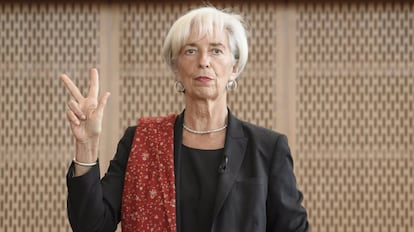IMF raises Spain’s 2017 growth forecast to 2.6% as global economy recovers
New estimate three-tenths of a point above January figure but fund says more labor reform needed
The spring meeting of the International Monetary Fund (IMF), which began on Tuesday, is having to deal with two new realities: a protectionist US president and Brexit, with the added uncertainty of a snap election in the United Kingdom set for June 8.

That said, the IMF predicts that the UK (2.0%) and the US (2.3%) will be among the top performers when it comes to the world’s large economies in 2017. The IMF estimates total global economic growth for 2017 will be 3.5%.
Growth for Spain in 2017 is estimated to be 2.6%, up three-tenths on the last forecast, in January, and putting the country slightly ahead of the United States and Britain in terms of GDP growth for this year.
Spain is still at risk from rising income inequality and poverty, says the OECD
Nevertheless, the new Spain figure falls significantly short of the 3.2% GDP growth Spain registered in 2016 and is particularly worrying for a country with high unemployment. The IMF is forecasting growth of 2.1% for 2018. Unemployment for this year is estimated to hit 17.7% and 16.6% for 2018. Currently it is at 18.6%.
The IMF’s managing director, Christine Lagarde, has praised Spain’s economic progress, but has called for further reforms to reduce labor market duality, or the coexistence of “temporary” contracts with low firing costs and permanent contracts with high firing costs.
Speaking in Brussels on Monday to the LENA alliance of leading European newspapers, Lagarde expressed her admiration for the “capacity for resistance of a country that has carried out serious and solid reforms.”
Thanks to reforms, the economy is turning the corner
Christine Lagarde, IMF Managing Director
“The figures have not improved miraculously: thanks to reforms, the economy is turning the corner away from the crisis; unemployment, while still very high, has fallen. And we expect it to continue falling,” said Lagarde, adding: “But we believe that the duality of the labor market, where temporary workers are exposed and where others with permanent contracts have greater protection, is not helping to resolve unemployment in Spain. This duality has to be tackled: one of the keys to Spain’s recovery has been the determination to carry out reform, for example to solve the instability of the banking sector and toxic loans.”
At the same time, Lagarde accepted that with youth unemployment at around 40%, public debt at 100% and rising poverty and inequality levels, Spain still had a long way to go.
“We cannot say we have accomplished our mission, but Spain has made great strides. Everything is easier with growth. Now Spain has growth: stronger momentum than any other EU member, except perhaps for the United Kingdom, and much stronger than the eurozone,” she said, concluding: “We hope this translates into more employment and higher incomes with a reform of the labor market.”
The new Spain IMF forecast is significantly short of the 3.2% GDP growth Spain registered in 2016
In a report last month, the Organisation for Economic Cooperation and Development (OECD) highlighted the dangers Spain faces from rising poverty levels and income inequality.
The OECD advocates government policies that will make growth more inclusive, including better-quality jobs, higher productivity, improved vocational education, investment in innovative businesses, expanded social relief programs, and hikes to environmental and consumption tax.
English version by Nick Lyne.









































